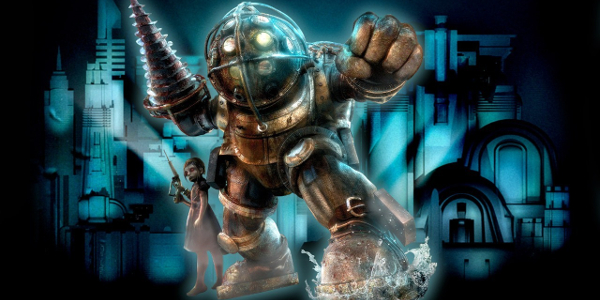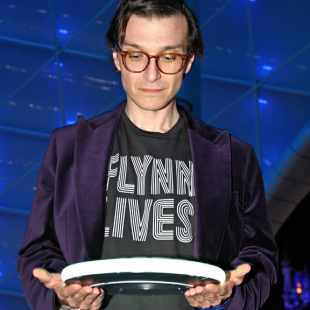Why It's Time To Make That Bioshock Movie, Hollywood

Your Daily Blend of Entertainment News
You are now subscribed
Your newsletter sign-up was successful
Back in 2008, after delivering the successful Pirates of the Caribbean trilogy to Disney's eager hands, Gore Verbinski had a special project in mind. An adaptation of the hit video game Bioshock was Verbinski's dream, and Universal was looking to help him make it into a reality. Part of the reason was probably because the series was so popular, making a huge impact on the pop culture of gamers at the time, but the other half had to have been the fact that the Pirates films did so damned well. Yet neither of those facts could save Gore Verbinski from the fact that the studio balked over two crucial elements: the proposed R-rating and the $200 million budget. It's for those reasons that the director left the project, which eventually folded; though after seeing A Cure For Wellness, it's clear that he's still got the project on his mind... and he should, without a question, be given the chance to bring it to life.
Without spoiling A Cure For Wellness, the film's resemblance to the story of Rapture's fall is pretty uncanny, without being a total ripoff. The new film centers its story around a health spa that isolates its patients from the outside world, getting them away from the rush and boom of the modern era. This is extremely similar to Andrew Ryan's creed of "No Gods. No Kings. Only Men" occupying the halls of Rapture. And, of course, the recurring theme of splicing and surgical / medical augmentation are a natural analog to the Cure for Wellness character Dr. Volmer's obsession with the "treatment" that he administers to all of his patients at his eponymous institute.
But besides the thematic similarities between A Cure For Wellness and Bioshock, you can tell in the film's visual language that Gore Verbinski clearly isn't done with this story yet. As far as the two problems facing the proposed Bioshock film are concerned, one would probably be easier to lick than the other. Obviously, the R-rating for the film is non-negotiable. The violence, the body modifications, and even the potential harvesting of Little Sisters are all fodder for gore-soaked nightmares, and it's just a part of the game's visual DNA. To tone it down to PG-13 levels would betray the material, and just plain suck.
However, depending on what the budget for A Cure For Wellness was, Gore Verbinski has proven that he can adapt the decaying, underwater world of Rapture with perfection. Take the Volmer Institut's setting, grime it up, throw in some wreckage and flooded passages, and you've basically got Andrew Ryan's haven. Not to mention, if the film takes advantage of funding perks courtesy of the German government, much like Cure did, it'd hedge the financial bet. So with a level headed financial plan, and some assistance from the outside, a studio that wanted to make a Bioshock film could sleep soundly, as the game series is still quite popular with its fans.
Even better is the fact that Bioshock has been around for over a decade, which not only ensures die hard citizens of Rapture would be flocking to the theater, but also that curious newcomers would be distanced enough from the start of the fad that they might feel more inclined to approach the series fresh. And should the film succeed, the advantage would be that there's two more games that could be adapted to form a Bioshock trilogy, with the opportunity being presented to not only tie all three films together, but to also rework the stories of Bioshock 2 and Bioshock: Infinite, so that they fit into an overarching narrative.

Most importantly though, A Cure For Wellness has only proven that Gore Verbinski is more than ready to bring Bioshock to the big screen. He was more than likely ready after making the Pirates of the Caribbean, but considering how similar his latest film is to the first game in the series, it basically serves as an informal audition to be given the job once again. In fact, the best piece of proof that we have to make this argument comes from an interview our own Sean O'Connell had with Gore Verbinski about whether or not his research for Bioshock informed his writing and directing process on A Cure For Wellness. Verbinski responded to that line of questioning with the following admission:
Not really, because [Bioshock is] a more more oedipal narrative, and deco. I mean, it's funny, because I'm hearing that from people, but there's nothing, I think there's just some images in the trailer that people are sort of triggering on ... [I] would have loved to make that movie.
The world of Rapture is still buried in the mind of Gore Verbinski, and A Cure For Wellness is a beautiful reminder of what could have been. It's also a good indication of what could be, should someone give him the right opportunity to resurrect the horrors and splendor that is Rapture. Hollywood, would you kindly give Mr. Verbinski the chance he needs to make this a reality? It's about time you did.
Your Daily Blend of Entertainment News
A Cure For Wellness will arrive in theaters on February 17th, and if you want to see what we thought of it, you can read our review here. If you need any further convincing that Bioshock's time has come, there's no greater example than that film.

Mike Reyes is the Senior Movie Contributor at CinemaBlend, though that title’s more of a guideline really. Passionate about entertainment since grade school, the movies have always held a special place in his life, which explains his current occupation. Mike graduated from Drew University with a Bachelor’s Degree in Political Science, but swore off of running for public office a long time ago. Mike's expertise ranges from James Bond to everything Alita, making for a brilliantly eclectic resume. He fights for the user.
